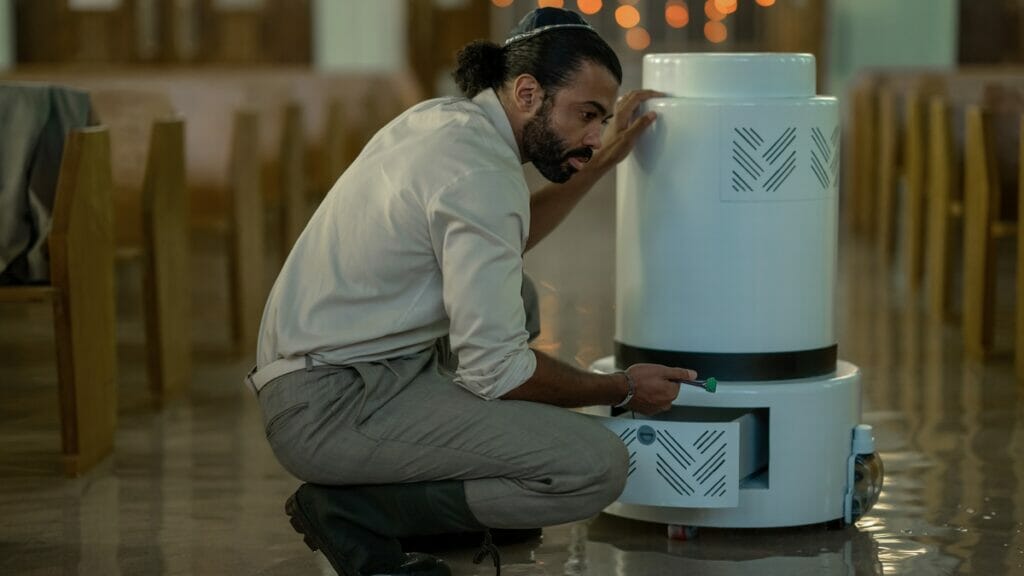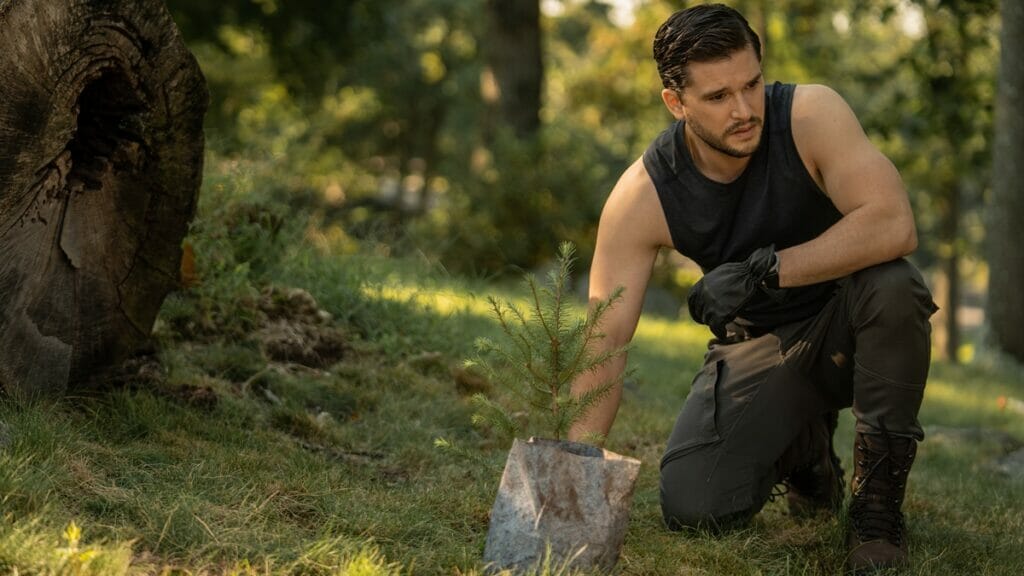AppleTV+’s climate change drama/warning series can’t separate the complex from the convoluted.
Much of the pre-release buzz about AppleTV+’s new original series Extrapolations was concerned with its potential to be preachy. In much the same way this writer doesn’t mind a bit of emotional manipulation in entertainment, I can be fine with preachiness. Some things are worth preaching about. Extrapolations’ flaw isn’t that it has a soapbox and is using it. It’s that it’s such a mess.
While loosely linked, Extrapolations is, essentially, an anthology series unfolding between 2037 and 2070. Generally, each episode is set in a different year (2037, 2046, 2047, 2066, 2068, and 2070), with one year, 2059, getting two. In this possible future, the world has largely continued to address global warming with anything but the bare minimum of actions. The “extrapolations” of the title are taking that premise, “what if we continued not to give a damn,” and imagined how the world would look beyond just “very badly.”

The immediate bad news/good news of the series is that it kicks off with what is easily its worst episode. Matthew Rhys and his comically oversized false teeth play a real estate developer so over-the-top cartoons think he’s overdoing it. His fate by episode’s end is a great joke, but it’s not entirely clear the show is in on the gag.
A later episode centered on rabbi Marshall Zucker (Daveed Diggs) proves more capable at landing a punchline. Set against the backdrop of a disappearing Miami, it ends up being a very dark extended joke about the things we cling to at the cost of everything more meaningful. Neska Rose as Alana, a teen synagogue member studying for her bat mitzvah, is a great supporting player. She asks serious questions of faith but mixes in just enough stone-faced teen demandingness to give them a comedic flair.
Other standout episodes include a heist and a dinner party gone horrifically awry. What the episodes and moments that work have in common are that they use the dystopian climate-ravaged world as a background while centering the people. The more the stories center technology or the specifics of the crisis, the worse it fares. It isn’t the aforementioned risk of preaching, it is how quickly it seems disconnected from our world.
At its best, Extrapolations functions as a portrait of humanity placed under nearly unbelievable, and at least partially avoidable, strain.
Seeing people struggle to throw a New Year’s Eve party or worry about their kids doing something regrettable in the context of this world is much more effective because it is relatable. The more it centers on the problem, the more it feels like full-out science fiction and becomes easy to dismiss. A mother worried that her lifestyle may have harmed her child is easy to get. On the other hand, a computer program that enables humans to converse with other mammalian animals feels like pure fiction. Sometimes not even the stacks of talent Extrapolations utilizes, including Tobey Maguire, Diane Lane, Marion Cotillard, Edward Norton, and Indira Varma, can make it feel human.
As a result, the anthology format is Extrapolations’ biggest strength and weakness. It allows the series to tell small human tales, but it also doesn’t stop it from going all out at others. It gives the whole experience a kind of careening energy that can be exhilarating but also often makes it hard to commit to the series’ viewpoint fully.

Another issue is Nick Bilton (Kit Harrington), a mysterious billionaire referenced often throughout the series. Harrington does well enough with the material, although he’s saddled with some pretty ridiculous “future” clothes late in the series. The bigger problem is Extrapolations ends up making him THE villain. Yes, there are some monstrous businessmen out there. Everyone reading this can rattle off a few without hesitation, almost certainly. But the key is “businessmen,” plural. Climate change is a problem caused by many people, not just one. To make Bilton this sort of master of the universe makes the problem of global warming seem like a thing that could be solved if we get that one guy.
It’s an admirable effort at arguing for action wrapped in a series of stories. At its best, Extrapolations functions as a portrait of humanity placed under nearly unbelievable, and at least partially avoidable, strain. But, too often, it stumbles over itself to scream at the viewers when simply talking will suffice. Yes, corporations will kill us all in their quest for profit. But one man doing it? That’s a stop too far. And it’s a mistake the show makes several times—a few times too many for it to recommend.
Extrapolations starts hazarding guesses about our futures March 16 on AppleTV+.
Extrapolations Trailer:
Read next: The Spool's Best New Releases
Streaming guides
The Best Live TV Streaming Services With Free Trial
The praises of live TV streaming services don’t need to be further sung. By now, we all know that compared to clunky, commitment-heavy cable, live TV is cheaper and much easier to manage. But just in case you’re still on the fence about jumping over to the other side, or if you’re just unhappy with ... The Best Live TV Streaming Services With Free Trial
How to Watch Power Book III: Raising Kanan Season 3
Season 3 of the hotly anticipated Power spin-off, Power Book III: Raising Kanan, is arriving on Starz soon, so you know what that means: it’s the ’90s again in The Southside, and we’re back with the Thomas family as they navigate the ins and outs of the criminal underworld they’re helping build. Mekai Curtis is ... How to Watch Power Book III: Raising Kanan Season 3
How to Watch Doctor Who: 60th Anniversary Specials
Ladies and gentlemen, we’re so back! To celebrate Doctor Who’s 60th anniversary, the BBC is producing a three-episode special starring none other than the Tenth/Fourteenth Doctor himself, David Tennant. And to the supreme delight of fans (that would be me, dear reader), the Doctor will be joined by old-time companion Donna Noble (Catherine Tate) and ... How to Watch Doctor Who: 60th Anniversary Specials
Which Netflix Country has Interstellar?
Maybe you’ve just seen Oppenheimer and have the strongest urge to marathon—or more fun yet, rank!—all of Christopher Nolan’s films. Or maybe you’re one of the few who haven’t seen Interstellar yet. If you are, then you should change that immediately; the dystopian epic is one of Nolan’s best, and with that incredible twist in ... Which Netflix Country has Interstellar?
Which Netflix Country Has Each Movie of The Hunger Games?
For whatever reason, The Hunger Games series isn’t available in the same countries around the world. You’ll find the first and second (aka the best) installments in Hong Kong, for instance, but not the third and fourth. It’s a frustrating dilemma, especially if you don’t even have a single entry in your region, which is ... Which Netflix Country Has Each Movie of The Hunger Games?
How to Watch ESPN With A Free Trial
One of the major concerns people have before cutting the cord is potentially losing access to live sports. But the great thing about live TV streaming services is that you never lose that access. Minus the contracts and complications of cable, these streaming services connect you to a host of live channels, including ESPN. So ... How to Watch ESPN With A Free Trial
How to Watch Paramount Network With a Free Trial
To date, Paramount Network has only two original shows on air right now: Yellowstone and Bar Rescue. The network seems to have its hands full with on-demand streaming service Paramount+, which is constantly stacked with a fresh supply of new shows. But Yellowstone and Bar Rescue are so sturdy and expansive that the network doesn’t ... How to Watch Paramount Network With a Free Trial
How to Watch WE TV With a Free Trial
Previously “Women’s Entertainment,” We TV has since rebranded to accurately reflect its name and be a more inclusive lifestyle channel. It’s home to addictive reality gems like Bold and Bougie, Bridezillas, Marriage Boot Camp, and The Untold Stories of Hip Hop. And when it’s not airing original titles, it has on syndicated shows like 9-1-1, ... How to Watch WE TV With a Free Trial
How to Watch Comedy Central With a Free Trial
It’s no coincidence that many of today’s biggest comedians found their footing on Comedy Central: the channel is a bastion of emerging comic talents. It served as a playground for people like Nathan Fielder (Fielder For You), Ilana Glazer and Abbi Jacobson (Broad City), Tim Robinson (Detroiters), and Dave Chappelle (Chappelle’s Show) before they shot ... How to Watch Comedy Central With a Free Trial
How to Watch FX With a Free Trial
You’d be hard-pressed to find a bad show airing on FX. The channel has made a name for itself as a bastion of high-brow TV, along with HBO and AMC. It’s produced shows like Atlanta, Fargo, The Americans, Archer, and more recently, Shogun. But because it’s owned by Disney, it still airs several blockbusters in ... How to Watch FX With a Free Trial
How to Watch TNT Sports With A Free Trial
For many sports fans, TNT is a non-negotiable. It broadcasts NBA, MLB, NHL, college basketball, and All Elite Wrestling matches. And, as a bonus, it also has reruns of shows like Supernatural, Charmed, and NCIS, as well as films like The Avengers, Dune, and Justice League. But while TNT used to be a cable staple, ... How to Watch TNT Sports With A Free Trial